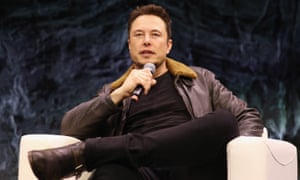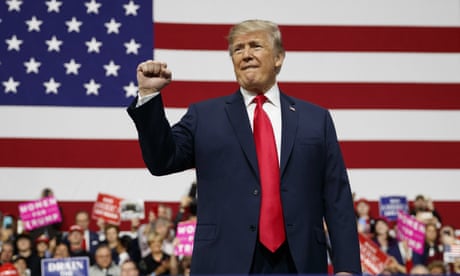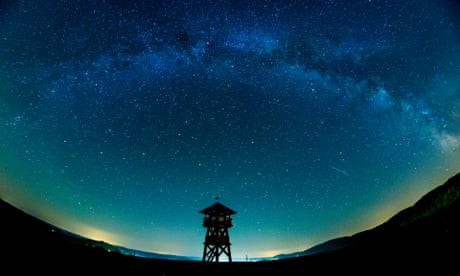New Zealand not big enough anymore?
Elon Musk: we must colonise Mars to preserve our species in a third world war
Founder of SpaceX, which is working on getting humans to the planet, speaks at SXSW amid rising nuclear tension
Olivia Solon
@oliviasolon
Email
Sun 11 Mar 2018 16.50 EDT Last modified on Sun 11 Mar 2018 17.45 EDT

Elon Musk speaks at SXSW: ‘If there’s a third world war we want to make sure there’s enough of a seed of human civilisation somewhere else to bring it back.’ Photograph: Diego Donamaria/Getty Images for SXSW
Humans must prioritise the colonisation of Mars so the species can be conserved in the event of a third world war, SpaceX and Tesla founder Elon Musk said on Sunday.

Trump under pressure over chaotic approach to North Korea nuclear talks
Read more
“It’s important to get a self-sustaining base on Mars because it’s far enough away from Earth that [in the event of a war] it’s more likely to survive than a moon base,” Musk said on stage at SXSW – just days after Donald Trump announced plans to meet the North Korean leader, Kim Jong-un, in an attempt to defuse rising nuclear tension.
“If there’s a third world war we want to make sure there’s enough of a seed of human civilisation somewhere else to bring it back and shorten the length of the dark ages,” Musk said, responding to questions from his friend Jonah Nolan, co-creator of TV show Westworld.
SpaceX is working on a vehicle that will take humans to Mars, a 100-metre ship codenamed the BFR (Big Fucking Rocket). But building a colony would require “tremendous entrepreneurial resources”, Musk said.
He also countered the suggestion that Mars might be “some escape hatch for rich people” by highlighting the risks of the mission: “It will be like Shackleton’s ad for Antarctic explorers: ‘Difficult, dangerous, a good chance you’ll die, excitement for those who survive.’ That kind of thing.
“There’s not many people who will want to go in the beginning,” he said, adding that over time the Red Planet colony would be hospitable and have “great bars. The Mars Bar! I love dad jokes, I’m a dad!”
The BFR will fly for the first time in the first half of 2019, Musk said, acknowledging that his “timelines historically have been optimistic”. The production of the Tesla Model 3 electric car, for example, has been plagued by delays.
Musk said he initially gave SpaceX and Tesla an estimated likelihood of success of just 10%.
Advertisement
“I wouldn’t let my friends invest because I didn’t want them to lose their money,” he said of SpaceX. Instead he funnelled his own money, from the sale of PayPal, into the businesses.
“SpaceX is alive by the skin of its teeth. So is Tesla. If things had gone a little bit the other way, both companies would be dead.”
Musk said he was now kept awake at night by the threat posed by unregulated artificial intelligence, which he has previously warned could lead humanity into a third world war – another the reason to go to Mars.
“Mark my words,” he said, “AI is much more dangerous than nukes. So why do we have no regulatory oversight?”
He suggested a public regulatory body would need “insight and oversight” to confirm that everyone was developing AI safely and in a way that is “symbiotic with humanity”.

Sign up for Lab Notes - the Guardian's weekly science update
Read more
However, even coming up with the safety parameters would present all sorts of insidious and unexpected risks, Musk said. If the utility function of artificial intelligence is to maximise happiness of humans, a super-intelligent AI might decide that the best way to do that is to capture all humans and inject their brains with dopamine and serotonin.
Musk proposed that digital intelligence should instead be directed to maximise “the freedom of action of humanity”.
The Q&A session ended on a surreal note as Musk, his younger brother Kimbal and Nolan all donned stetsons and sang a snippet of My Little Buttercup, a song from the 1986 movie The Three Amigos.
“This is going to be real bad,” warned Musk. He was right.
https://www.theguardian.com/technology/2018/mar/11/elon-musk-colonise-mars-third-world-war
Elon Musk: we must colonise Mars to preserve our species in a third world war
Founder of SpaceX, which is working on getting humans to the planet, speaks at SXSW amid rising nuclear tension
Olivia Solon
@oliviasolon
Sun 11 Mar 2018 16.50 EDT Last modified on Sun 11 Mar 2018 17.45 EDT

Elon Musk speaks at SXSW: ‘If there’s a third world war we want to make sure there’s enough of a seed of human civilisation somewhere else to bring it back.’ Photograph: Diego Donamaria/Getty Images for SXSW
Humans must prioritise the colonisation of Mars so the species can be conserved in the event of a third world war, SpaceX and Tesla founder Elon Musk said on Sunday.

Trump under pressure over chaotic approach to North Korea nuclear talks
Read more
“It’s important to get a self-sustaining base on Mars because it’s far enough away from Earth that [in the event of a war] it’s more likely to survive than a moon base,” Musk said on stage at SXSW – just days after Donald Trump announced plans to meet the North Korean leader, Kim Jong-un, in an attempt to defuse rising nuclear tension.
“If there’s a third world war we want to make sure there’s enough of a seed of human civilisation somewhere else to bring it back and shorten the length of the dark ages,” Musk said, responding to questions from his friend Jonah Nolan, co-creator of TV show Westworld.
SpaceX is working on a vehicle that will take humans to Mars, a 100-metre ship codenamed the BFR (Big Fucking Rocket). But building a colony would require “tremendous entrepreneurial resources”, Musk said.
He also countered the suggestion that Mars might be “some escape hatch for rich people” by highlighting the risks of the mission: “It will be like Shackleton’s ad for Antarctic explorers: ‘Difficult, dangerous, a good chance you’ll die, excitement for those who survive.’ That kind of thing.
“There’s not many people who will want to go in the beginning,” he said, adding that over time the Red Planet colony would be hospitable and have “great bars. The Mars Bar! I love dad jokes, I’m a dad!”
The BFR will fly for the first time in the first half of 2019, Musk said, acknowledging that his “timelines historically have been optimistic”. The production of the Tesla Model 3 electric car, for example, has been plagued by delays.
Musk said he initially gave SpaceX and Tesla an estimated likelihood of success of just 10%.
Advertisement
“I wouldn’t let my friends invest because I didn’t want them to lose their money,” he said of SpaceX. Instead he funnelled his own money, from the sale of PayPal, into the businesses.
“SpaceX is alive by the skin of its teeth. So is Tesla. If things had gone a little bit the other way, both companies would be dead.”
Musk said he was now kept awake at night by the threat posed by unregulated artificial intelligence, which he has previously warned could lead humanity into a third world war – another the reason to go to Mars.
“Mark my words,” he said, “AI is much more dangerous than nukes. So why do we have no regulatory oversight?”
He suggested a public regulatory body would need “insight and oversight” to confirm that everyone was developing AI safely and in a way that is “symbiotic with humanity”.

Sign up for Lab Notes - the Guardian's weekly science update
Read more
However, even coming up with the safety parameters would present all sorts of insidious and unexpected risks, Musk said. If the utility function of artificial intelligence is to maximise happiness of humans, a super-intelligent AI might decide that the best way to do that is to capture all humans and inject their brains with dopamine and serotonin.
Musk proposed that digital intelligence should instead be directed to maximise “the freedom of action of humanity”.
The Q&A session ended on a surreal note as Musk, his younger brother Kimbal and Nolan all donned stetsons and sang a snippet of My Little Buttercup, a song from the 1986 movie The Three Amigos.
“This is going to be real bad,” warned Musk. He was right.
Since you’re here …
… we have a small favour to ask. More people are reading the Guardian than ever but advertising revenues across the media are falling fast. And unlike many news organisations, we haven’t put up a paywall – we want to keep our journalism as open as we can. So you can see why we need to ask for your help. The Guardian’s independent, investigative journalism takes a lot of time, money and hard work to produce. But we do it because we believe our perspective matters – because it might well be your perspective, too.If everyone who reads our reporting, who likes it, helps fund it, our future would be much more secure. For as little as $1, you can support the Guardian – and it only takes a minute. Thank you.Thomasine F-R. wrote:I appreciate there not being a paywall: it is more democratic for the media to be available for all and not a commodity to be purchased by a few. I’m happy to make a contribution so others with less means still have access to information.
https://www.theguardian.com/technology/2018/mar/11/elon-musk-colonise-mars-third-world-war






 Sat Mar 23, 2024 11:33 pm by globalturbo
Sat Mar 23, 2024 11:33 pm by globalturbo

